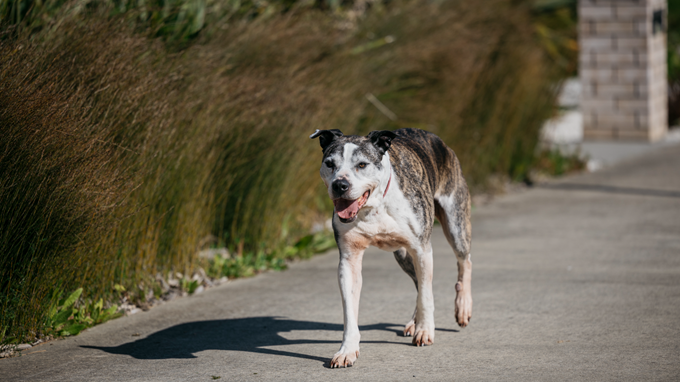Auckland Council urges dog owners to help ‘break the cycle’ as new data revealed
Auckland Council
08 September 2025, 7:02 PM
 The council received a record number of roaming dog complaints in FY24/25.
The council received a record number of roaming dog complaints in FY24/25.High numbers of undesexed, roaming dogs are continuing to put communities at risk, says Auckland Council, as new figures show the scale of Auckland’s dog problems.
Released today, the council’s Animal Management Annual Report FY24/25 [5.94MB] shows roaming dogs are a persistent issue for Auckland, with an unprecedented 16,739 reports made to the council during the year. Dog attacks remain at unacceptably high levels, with a record 1,341 reported attacks on people and 1,253 attacks on other animals.
Animal Management Manager Elly Waitoa says the council is doing all it can to tackle Auckland’s dog problems, but irresponsible owners are continuing to put people, other animals, and the dogs themselves at risk.
“Our staff work incredibly hard to keep Aucklanders safe from dog-related harm. Unfortunately, we are still seeing people not registering or desexing their dogs and not keeping them contained on their properties, leading to an endless cycle of more litters, more roaming dogs and more attacks. It gets harder each year to keep on top of.”
Shelters under strain
The council responded to almost 40,000 requests for service during the year and impounded a record 10,214 dogs — up 23 per cent from the previous year. This has meant that its three shelters have been operating at or near capacity at all times.
Ms Waitoa says that one reason for the increase is that we are seeing increasing numbers of dumped litters of puppies coming through shelters.
“Around 22 per cent of dogs impounded in 2025 were puppies under three months old, and this included over 200 litters of three puppies or more. There is a clear link between high numbers of unwanted puppies, and the fact most roaming dogs are not desexed.”
An excess of cheap or free available puppies may be one reason why many dog owners don’t bother collecting their dogs when they are impounded. Only 35 per cent of owners claimed their dogs from shelters within the seven-day impoundment period — the lowest ever recorded rate by a significant margin— resulting in a 60 per cent euthanasia rate for impounded dogs.
“This is unacceptable to the public and it’s unacceptable for us,” says Ms. Waitoa.
“Our staff are all dog-lovers, and the high euthanasia rate puts a significant toll on them. But when you have shelters full of unregistered dogs with behaviour issues that cannot be safely rehomed, no one coming in to claim them, and more aggressive dogs on the streets needing to be impounded every day, there is no other option.”
Desex, desex, desex
Ms Waitoa says that if she had one message for dog owners, it would be for them to please desex their dogs.
“Desexing is one of the simplest, most effective steps dog owners can take to break this cycle. It reduces aggression, lowers the likelihood of roaming and attacks, and decreases the number of dogs ending up in shelters. It benefits both the dogs and the community.”
While providing desexing services is not something councils are required to do, Auckland Council has stepped into this space due to the significant need.
Earlier this year, a new internal veterinary services team was formed as a pilot at its Henderson shelter, offering free desexing and a dog pick-up/drop-off service targeting high risk areas and dog breeds and where there are barriers in place preventing owners from visiting desexing clinics.
A partnership with the SPCA has also allowed Animal Management Officers to give free desexing vouchers to dog owners they encounter in suburbs where there are high numbers of roaming complaints.
In addition, the council is calling on central government to support councils with improved regulation of desexing under the Dog Control Act. This could allow councils to desex an impounded dog before it is returned to its owner, for example, which cannot be done under current legislation.
Tackling the problem from all angles
While there is no single solution to addressing Auckland’s dog problems, the council introduced a range of new initiatives to tackle dog-related issues in FY24/25.
These include an additional $5.9 million funding investment in Animal Management services, including increasing the capacity of front-line staff. The council has opened a new adoption-only shelter in Pukekohe, introduced the in-house desexing pilot at its Henderson Shelter, and is expanding the Manukau shelter by 28 kennels.
Public education campaigns, targeted desexing programmes in high-risk areas and registration drives are other initiatives underway, along with advocacy to central government for strengthened powers under dog control legislation.
Chair of the Regulatory and Safety Committee, Cr Josphine Bartley, says she is fully in support of these measures, but ultimately, irresponsible dog owners need to lift their game.
“Every Aucklander deserves to feel safe in their neighbourhood, and every dog deserves a secure, caring home. While most dog owners do the right thing, we need the rest to step up and ensure their dogs are desexed and properly controlled, otherwise these problems are going to keep getting worse.”
Read the full Animal Management Annual Report FY24/25.



